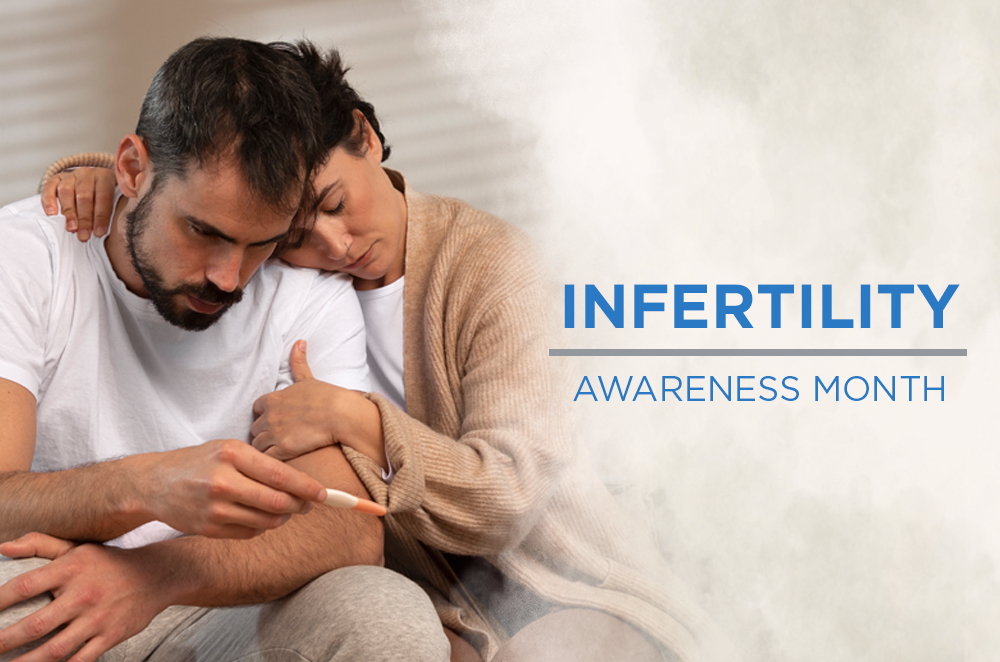June is Infertility Awareness Month, a time dedicated to shedding light on a deeply personal and often challenging journey that impacts countless individuals and couples worldwide. While it’s easy to feel alone when facing infertility, the reality is, it’s far more common than many realize.
For instance, the World Health Organization estimates that roughly 1 in 6 people globally are affected by infertility. That’s a significant number, representing millions of dreams and aspirations. Furthermore, this isn’t just a “women’s issue” either. Infertility affects both men and women, with about one-third of cases attributed to the female partner, one-third to the male partner, and the remaining third due to a combination of factors in both partners or unexplained causes.
The journey to conceive can be emotionally taxing, filled with hope, disappointment, and sometimes, a sense of isolation. However, it’s important to remember that it’s okay to feel whatever you’re feeling – whether it’s frustration, sadness, or a determination to keep going.
Who Does Infertility Affect?
Infertility doesn’t discriminate. It can affect people of all backgrounds, ages, and circumstances. Although fertility naturally declines with age, particularly for women after 35 and gradually for men after 40, younger individuals can also experience infertility.
What Are Some Causes?
The causes of infertility can be varied and sometimes complex. Specifically, here are some of the common factors:
For Women:
- Ovulation disorders: Problems with the release of eggs from the ovaries, often due to conditions like Polycystic Ovary Syndrome (PCOS).
- Uterine or cervical abnormalities: Issues with the uterus’s shape, fibroids, polyps, or cervical mucus problems.
- Fallopian tube damage or blockage: Often caused by pelvic inflammatory disease, endometriosis, or previous abdominal surgery.
- Endometriosis: A condition where tissue similar to the lining of the uterus grows outside the uterus.
- Primary ovarian insufficiency (early menopause): When the ovaries stop functioning before age 40.
For Men:
- Abnormal sperm production or function: Issues with sperm count, motility, or morphology due to various factors including undescended testicles, genetic defects, or infections.
- Problems with sperm delivery: Such as premature ejaculation, certain genetic diseases, structural problems, or damage to the reproductive organs.
- Overexposure to environmental factors: Heat, pesticides, and certain chemicals can impact sperm production.
- Damage related to cancer and its treatment: Radiation or chemotherapy can impair sperm production.
Unexplained Infertility:
- Sometimes, despite thorough testing, no specific cause can be identified.
When Should You See a Doctor?
Knowing when to seek medical advice for infertility is an important step. Generally, it’s recommended to consult a doctor if:
- You’re under 35 and have been trying to conceive for one year or more without success.
- You’re 35 or older and have been trying to conceive for six months or more without success.
- You have known risk factors for infertility, regardless of how long you’ve been trying. These include irregular or absent periods, a history of pelvic inflammatory disease, multiple miscarriages, or prior treatments for cancer.
- Your male partner has known fertility issues or risk factors.
How Can CCMH Support You?
At Comanche County Memorial Hospital, we are committed to providing compassionate and comprehensive care for our community. While we understand the emotional weight of infertility, we want you to know you’re not alone in this journey. Our Women’s Health services are designed to address a wide range of gynecological and reproductive needs. Our team of experienced OB/GYNs is here to help you explore potential causes of infertility and guide you through the first steps.
Here are some of the services we offer:
Initial Consultations and Evaluations: Our physicians can help assess your situation, conduct preliminary diagnostic testing, and discuss potential factors contributing to infertility.
Family Planning and Pre-Pregnancy Guidance: For those just beginning their journey, we offer advice on optimizing natural fertility and preparing your body for a healthy pregnancy.
Gynecological Services: Many underlying gynecological conditions can impact fertility, and our team is equipped to diagnose and treat these issues.
Referrals to Specialists: Should your situation require more specialized reproductive technologies or interventions, we can provide referrals to trusted fertility clinics and specialists in Oklahoma who offer advanced treatments like IVF and IUI. Our goal is to ensure you receive the most appropriate and effective care, even if that means connecting you with experts beyond our walls.
This Infertility Awareness Month, let’s break the silence surrounding infertility. If you or a loved one are struggling, know that we are here to be a resource and a partner in your journey. Don’t hesitate to reach out to our Women’s Health department to learn more about how we can support you. You deserve care, understanding, and hope.
Resources:
https://www.mayoclinic.org/diseases-conditions/infertility/symptoms-causes/syc-20354317
https://resolve.org/learn/infertility-101/facts-diagnosis-and-risk-factors/
https://www.who.int/news-room/fact-sheets/detail/infertility
Disclaimer:
The Comanche County Memorial Hospital website does not provide specific medical advice for individual cases. Comanche County Memorial Hospital does not endorse any services obtained through information provided on this site, articles on the site or any links on this site.
Use of the information obtained by the Comanche County Memorial Hospital website does not replace medical advice given by a qualified medical provider to meet the medical needs of our readers or others.
While content is frequently updated, medical information changes quickly. Information may be out of date, and/or contain inaccuracies or typographical errors. For questions or concerns, please contact us at contact@ccmhhealth.com.

